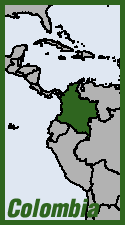 Francisco Javier Ricaurte Gómez, one of the most powerful men in Colombia's justice system for the past 15 years, on Sept. 20 became the first former chief magistrate of the country's Supreme Court to go to prison. Bogotá daily El Tiempo reports that Ricuarte faces four charges related to the corruption scandal now unfolding in Colombia's highest judicial body. The Fiscalía, the country's top prosecutor, says he is one of the brains behind a ring that took in millions of pesos to pervert criminal cases.
Francisco Javier Ricaurte Gómez, one of the most powerful men in Colombia's justice system for the past 15 years, on Sept. 20 became the first former chief magistrate of the country's Supreme Court to go to prison. Bogotá daily El Tiempo reports that Ricuarte faces four charges related to the corruption scandal now unfolding in Colombia's highest judicial body. The Fiscalía, the country's top prosecutor, says he is one of the brains behind a ring that took in millions of pesos to pervert criminal cases.
Prosecutor General Nestor Humberto Martínez said Ricaurte is suspected of accepted bribes from Martínez's own hand-picked anti-corruption chief, Luis Gustavo Moreno Rivera—who was arrested in June under pressure from the US Drug Enforcement Administration.
In mid-June, Moreno traveled to Miami to give an anti-corruption presentation to the Internal Revenue Service. But, the Miami Herald reported, Moreno apparently had ulterior motives for the trip. US aithorities say Moreno and a fellow attorney acting as his middleman met at the Dolphin Mall in Doral with a Colombian politician who had left the country to elude a corruption probe. In a mall bathroom, the contact passed on a manila envalope filled with $10,000 in cash to the duo—in exchange for information about the investigation back home.
The contact was none other than Alejandro Lyons Muskus, the former governor of Córdoba department, then facing bribery and embezzlement charges in Colombia. But Lyons had already been co-opted by US authorities, and promptly ratted out Moreno. Both Moreno and his attorney Leonardo Luis Pinilla were arrested on an Interpol Red Warrant upon their arrival home in Colombia, and may face extradition back to Florida.
Also implicated in the bribery scandal at the Supreme Court are Colombian congressmen suspected of protecting the illegal paramilitaries that remain active in the countryside, terrorizing the peasants and vying for control of the cocaine trade. Lyons is both accused of taking bribes from shady interests to allow extraction of natural resources in Córdoba and of collaborating with local paramilitaries. He's especially being linked to the 2014 assassination of Jairo Alberto Zapa, an interior ministry official who was investigating the sleaze in Córdoba.
This is the condition that prevails on the ground across much of rural Colombia: a criminal network that controls both the cocaine trade and the resource industries, enforced by paramilitary terror and protected by local politicians. Now the chain of complicity has reached the highest levels of Colombian justice.
Cross-post to High Times







Recent comments
2 weeks 6 days ago
3 weeks 2 hours ago
6 weeks 19 hours ago
7 weeks 2 hours ago
11 weeks 9 hours ago
14 weeks 5 days ago
18 weeks 6 days ago
19 weeks 4 days ago
29 weeks 4 days ago
33 weeks 4 days ago